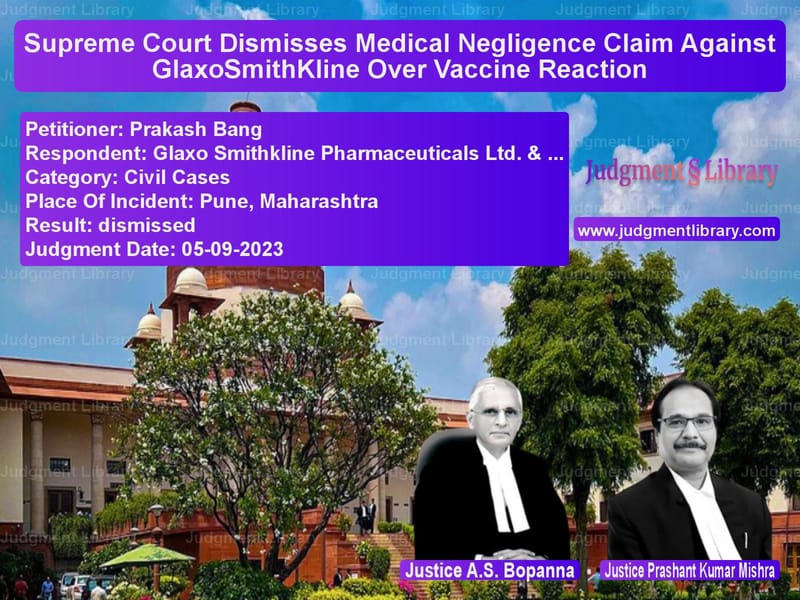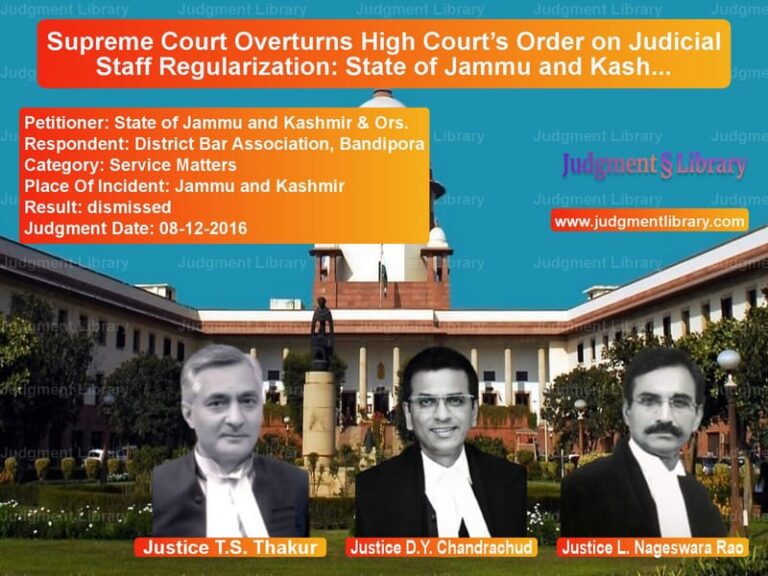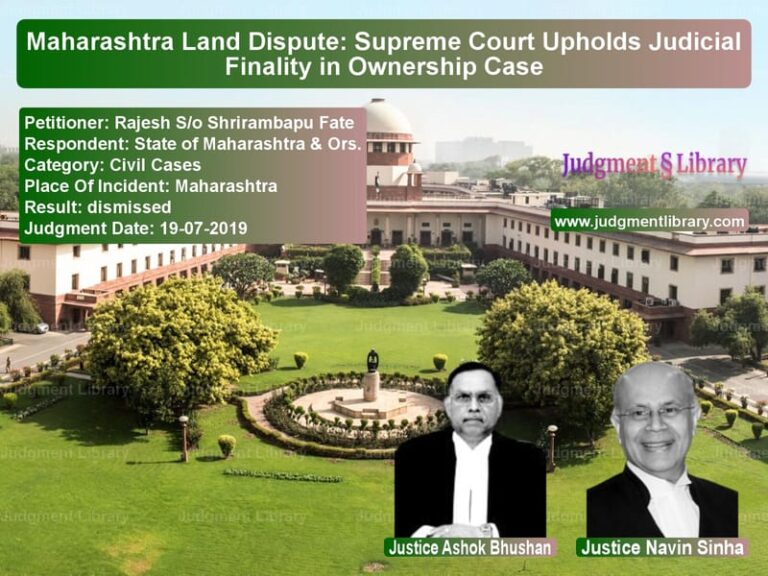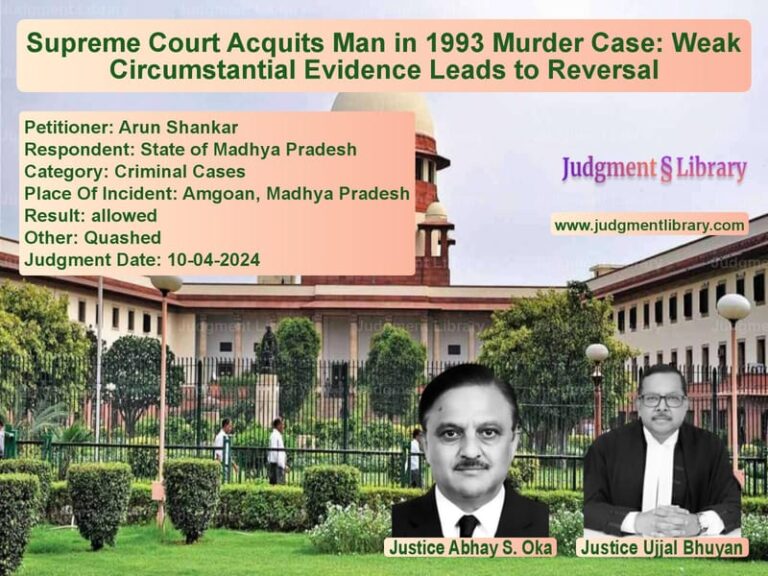Supreme Court Dismisses Medical Negligence Claim Against GlaxoSmithKline Over Vaccine Reaction
The Supreme Court of India recently ruled on a contentious case involving allegations of medical negligence against GlaxoSmithKline Pharmaceuticals Ltd. regarding an alleged adverse reaction to the hepatitis B vaccine, Engerix-B. The case was filed by Prakash Bang, who claimed that the vaccine caused him permanent disability in his left shoulder. The Court ultimately dismissed the claim, affirming the decision of the National Consumer Disputes Redressal Commission (NCDRC).
Background of the Case
In August 1998, Prakash Bang and his family received the hepatitis B vaccine, Engerix-B, administered by his family physician, Dr. Satyajit Pathak. While his wife and children experienced no adverse effects, Bang claimed that he developed severe shoulder pain four days later. He sought medical attention from multiple doctors, underwent tests, and was eventually diagnosed with myositis, a condition that he attributed to the vaccine.
Bang, who was a Chief Executive at M/s Quicksel Communications, claimed that his ability to work was severely impacted. When his complaints to GlaxoSmithKline were not satisfactorily addressed, he filed a complaint with the NCDRC, demanding ₹90,20,557 in compensation for negligence and deficiency in service.
Arguments by the Petitioner (Prakash Bang)
Bang’s primary arguments before the NCDRC and later the Supreme Court were:
- The vaccine was defective and caused a severe adverse reaction leading to myositis and subsequent permanent disability.
- GlaxoSmithKline failed to mention myositis as a possible side effect in the literature accompanying the vaccine.
- The manufacturer did not take adequate responsibility when he reported the issue.
- The company should be held liable for negligence and ordered to compensate him for the damages suffered.
Arguments by the Respondents (GlaxoSmithKline Pharmaceuticals Ltd.)
GlaxoSmithKline disputed Bang’s claims, arguing that:
- There was no evidence that Bang had even purchased or received the vaccine as he alleged.
- His family members received the same vaccine from the same batch without any issues, suggesting that the problem was not with the vaccine.
- Myositis is an extremely rare condition, occurring in only 0.02 per million doses, and could be caused by numerous factors unrelated to the vaccine.
- Bang failed to provide a muscle biopsy or other medical evidence conclusively linking his condition to the vaccine.
- The vaccine had passed all safety and quality tests and was approved for use worldwide.
Findings of the NCDRC
The NCDRC ruled against Bang, stating that he had “miserably failed” to prove that the vaccine caused his condition. The commission found:
- There was no documentary evidence proving Bang’s purchase or administration of the vaccine.
- Bang’s own family members, who received the same vaccine, did not suffer any adverse effects.
- Medical experts had confirmed that myositis could have multiple causes, and Bang had not established a direct link between his condition and the vaccine.
- GlaxoSmithKline had no obligation to mention myositis as an adverse reaction since it was a statistically insignificant occurrence.
Supreme Court’s Judgment
The Supreme Court, in an opinion delivered by Justice A.S. Bopanna, upheld the NCDRC’s ruling and dismissed the appeal. The key findings included:
“There is no documentary evidence to indicate the very basic issue of the purchase of the vaccine and the same being administered.”
“The family doctor’s affidavit only states that he administered the vaccine but does not establish a direct link between the vaccine and the alleged myositis.”
The Court also noted that Bang failed to provide a muscle biopsy despite being asked, which weakened his claim.
Key Legal Considerations
The judgment reaffirmed that in cases of medical negligence, the burden of proof lies on the complainant. The Court cited previous rulings, including Malay Kumar Ganguly vs. Dr. Sukumar Mukherjee, where it was held that expert affidavits must be supported by medical records and substantial evidence.
The Court further observed:
“The manufacturer cannot be held liable for failing to list myositis as a side effect when it is a statistically negligible occurrence.”
Impact of the Judgment
This ruling sets a precedent for future cases involving medical negligence claims against pharmaceutical companies. It establishes that:
- Claimants must provide concrete medical evidence to prove causation.
- Pharmaceutical companies cannot be held responsible for side effects that are statistically insignificant.
- Courts will not entertain claims based solely on personal assumptions without scientific backing.
Conclusion
The Supreme Court’s verdict in this case reinforces the principle that allegations of medical negligence must be supported by clear and convincing evidence. The ruling protects pharmaceutical companies from frivolous lawsuits while ensuring that legitimate claims are thoroughly examined.
For consumers, this judgment highlights the importance of maintaining proper medical documentation and seeking expert opinions before pursuing legal action. It serves as a crucial reminder that in medical liability cases, the burden of proof is key.
Petitioner Name: Prakash Bang.Respondent Name: Glaxo Smithkline Pharmaceuticals Ltd. & Anr..Judgment By: Justice A.S. Bopanna, Justice Prashant Kumar Mishra.Place Of Incident: Pune, Maharashtra.Judgment Date: 05-09-2023.
Don’t miss out on the full details! Download the complete judgment in PDF format below and gain valuable insights instantly!
Download Judgment: prakash-bang-vs-glaxo-smithkline-pha-supreme-court-of-india-judgment-dated-05-09-2023.pdf
Directly Download Judgment: Directly download this Judgment
See all petitions in Consumer Rights
See all petitions in Damages and Compensation
See all petitions in Legal Malpractice
See all petitions in Judgment by A. S. Bopanna
See all petitions in Judgment by Prashant Kumar Mishra
See all petitions in dismissed
See all petitions in supreme court of India judgments September 2023
See all petitions in 2023 judgments
See all posts in Civil Cases Category
See all allowed petitions in Civil Cases Category
See all Dismissed petitions in Civil Cases Category
See all partially allowed petitions in Civil Cases Category







